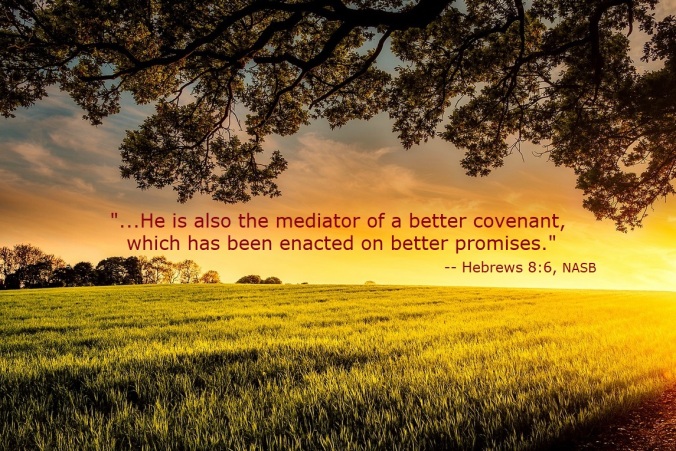“Go therefore and make disciples of all the nations…teaching them to observe all that I commanded you; and lo, I am with you always, even to the end of the age” (Matt. 28:19-20).
——————-
Contents:
1) Look Again (R.J. Evans)
2) He “Disrespected” Me (Greg Gwin)
3) How Happy Are You? (Tom Wheeler)
——————–

-1-
Look Again
R.J. Evans
Some time ago I read an interesting story. I can’t guarantee its veracity, but it certainly makes a good point. It took place one spring before the Civil War. A young man, in search of a job, came to a prosperous Ohio farmer’s place. The farmer knew nothing about the boy except that his name was Jim, but he gave him a job. Jim spent the spring and summer cutting stove wood, bringing in the cows, and making himself generally useful. He ate in the kitchen, but slept in the hayloft.
Before the summer was over, Jim had fallen in love with the farmer’s daughter. The young man asked to marry his daughter, but the farmer refused to let him marry her — telling him bluntly that he had no money, no name, and very poor prospects. So Jim sadly put his belongings in his old carpet bag and disappeared, never to show up again.
Many years later, the farmer was tearing down his old barn in order to build a new one. On one of the rafters above the hayloft, he discovered that Jim had carved his full name into the wood — James A. Garfield. At that time “Jim” was the President of the United States!
What a shock that must have been to the farmer! His daughter could have been the First Lady of the United States. We all have, at times, made mistaken judgments about another person. We think a certain person won’t amount to anything, he will never make a contribution to society, or he will never live a productive life. But with regard to some, as the years pass, the person matures, he is educated and trained, and applying his skills, he becomes successful.
This is certainly true when it has to do with a sinner and the power of the gospel of Christ. The Apostle Paul said it this way: “Therefore, if anyone is in Christ, he is a new creation; old things have passed away; behold, all things have become new” (2 Cor. 5:16-17). Jesus taught that we must be born again (Jn. 3:3-5). When a penitent believer is baptized, that puts him “in Christ, he is a new creation.” This is clearly taught in Galatians 3:26-27: “For you are all sons of God through faith in Christ Jesus. For as many of you as were baptized into Christ have put on Christ.” The gospel has the power to transform us from being an ugly filthy sinner, into a beautiful forgiven child of God who has been conformed to the image of His Son (Rom. 1:16; 8:29; 12:2).
Who could have foreseen that the Apostle Peter would become the bold proclaimer of the gospel of Christ after his denial of the Lord? Who would have thought that Saul of Tarsus would be such a devoted servant and apostle after spending the first part of his life persecuting Christians? Who could have predicted that John would become known as “the Apostle of love” after he and his brother were nicknamed “Sons of Thunder”? Remember, it was he, and his brother James, who wanted the Lord to command fire to come down and destroy a Samaritan village (Mk. 3:17; Lk. 9:54).
Yes, there are times when we need to look again — take a second look. John Billings, the 19th century American humorist, once said: “I have lived in this world just long enough to look carefully the second time, into things I am the most certain of the first time.”
************************************
“JIM” IN TODAY’S ARTICLE
James A. Garfield was a member of the Lord’s church. He obeyed the gospel on March 4, 1850. He preached the gospel up until he became president. He was shot 3 months into his presidency and died 3 months later in 1881 at age 49. Another interesting story is told about him. The first week after his inauguration as President of the United States, a member of his cabinet insisted on an urgent meeting at 10:00 Sunday morning to handle a threatened national crisis. Garfield refused to attend because he had a more important appointment. The cabinet member demanded to know what it was. The president replied, “I will be as frank as you are. My engagement is with the Lord to meet Him in His house at His table at 10:00 tomorrow, and I shall be there.” You can read more about him online. Google: James A. Garfield, Church of Christ.
— via bulletin for the Southside church of Christ, Gonzales, Louisiana, January 28, 2018
——————–

-2-
He “Disrespected” Me
Greg Gwin
It’s common to hear the young folks speak of someone “dissing” another person. That is a shortened slang word for “disrespecting,” which means to treat with contempt or rudeness. Sadly, this happens far too often. In fact, it happened to me just the other day. The offender was a man in a position of governmental authority. I was a simple law-abiding citizen. In a verbal exchange, he was rude and mean-spirited. He “dissed” me!
Later, I was thinking about this episode, and considering what I could have said or done. I imagined quick and cutting replies I could have made. This man needed to be taught a thing or two. “Put him in his place,” I thought. Or, perhaps I should have gotten his name and notified his superiors concerning his inappropriate behavior. Let his bosses deal with this arrogant fella. After all, if he is to be out in the public, he needs to know how to relate to others in the right way. I was angry — downright mad — and there was surely some way to “get even” with this haughty, obnoxious individual.
But then, it occurred to me that it didn’t really matter. So what if he was rude? It didn’t harm me in any significant way. The only damage was to my pride, and that isn’t important at all. In fact, the only thing my pride does is get me in trouble. He “dissed” me, but I’m no worse for the episode.
Our Lord taught us that when our pride is assaulted we ought to “turn the other cheek” and “go the extra mile” (Matthew 5:38-42). The only reason this is hard is because we are tempted to “think more highly of ourselves than we ought to think” (Romans 12:3).
We are not implying that such “disrespect” is OK, or that it is excusable. Neither are we saying that God won’t hold men accountable for such things. But, the lesson for us is that we learn to live with it in a way that will not harm our relationship with the Father or our influence on others. In the final analysis, that’s really all that matters.
— Via the bulletin of the Collegevue church of Christ, March 18, 2018
——————–

-3-
How Happy Are You?
Tom Wheeler
“Rejoice in the lord always: and again I say rejoice” (Phil. 4:4).
Look at all of the blessings that Christians have. The material blessings are available for everyone and they are without number. We live in a country that is well blessed with material things, freedom, beauty of all kinds — and how long could the list be! Even the air that we breathe, the water that we drink, and the ground that we walk upon are blessings from God. In addition to these things Christians have the forgiveness of sins, fellowship with God and fellow Christians, and the hope of an eternity in the presence of God. God has written to us about the assurance of His love, the blessedness of His hope, and the wonders of salvation. We can, by adhering to His word, bask in the sunshine of His love.
When we look around us and observe fellow Christians, what do we see and hear? There is murmuring and complaining. There is worry about mundane things and things that we cannot do anything about, and we complain about everything in sight.
We must learn to exercise our minds, and learn to separate the good from the evil. God says “rejoice” and we need to be learning how.
— via bulletin for the Collegevue church of Christ, December 10, 2017
——————–
The Steps That Lead to Eternal Salvation
1) Hear the gospel, for that is how faith comes (Rom. 10:17; John 20:30-31).
2) Believe in the deity of Christ (John 8:24; John 3:18).
3) Repent of sins (Luke 13:5; Acts 17:30).
4) Confess faith in Christ (Rom. 10:9-10; Acts 8:36-38).
5) Be baptized in water for the remission of sins (Mark 16:16; Acts 2:38; 22:16; Rom. 6:3-4; Gal. 3:26-27; 1 Pet. 3:21).
6) Continue in the faith, living for the Lord; for, if not, salvation can be lost (Heb. 10:36-39; Rev. 2:10; 2 Pet. 2:20-22).
——————–
Tebeau Street
CHURCH OF CHRIST
1402 Tebeau Street, Waycross, GA 31501
Sunday services: 9:00 a.m. (Bible class); 10 a.m. & 5 p.m. (worship)
Wednesday: 7 p.m. (Bible class)
evangelist/editor: Tom Edwards (912) 281-9917
Tom@ThomasTEdwards.com
http://thomastedwards.com/go (Older version of Gospel Observer website without pictures, but back to March 1990)
http://tebeaustreetchurchofchrist.org/
http://ThomasTEdwards.com/audioser.html (audio sermons)




